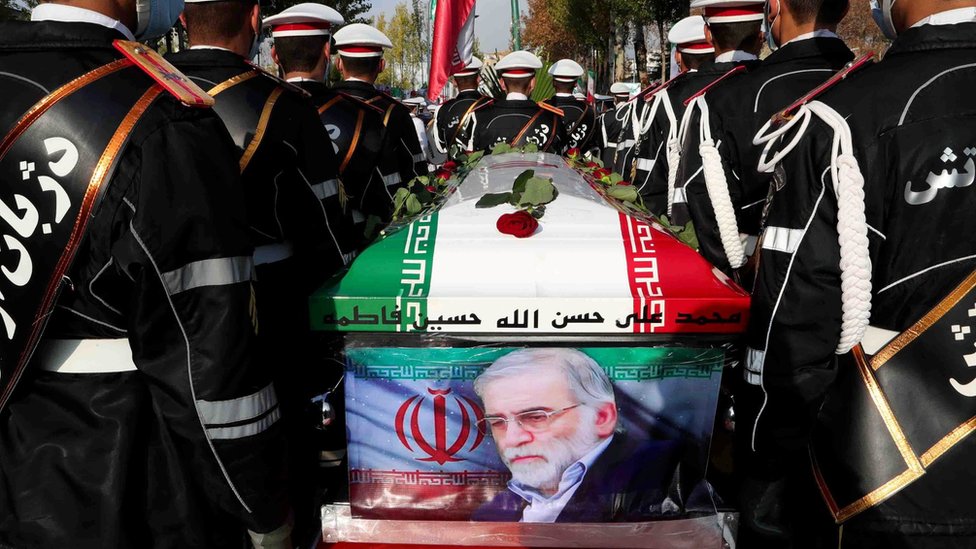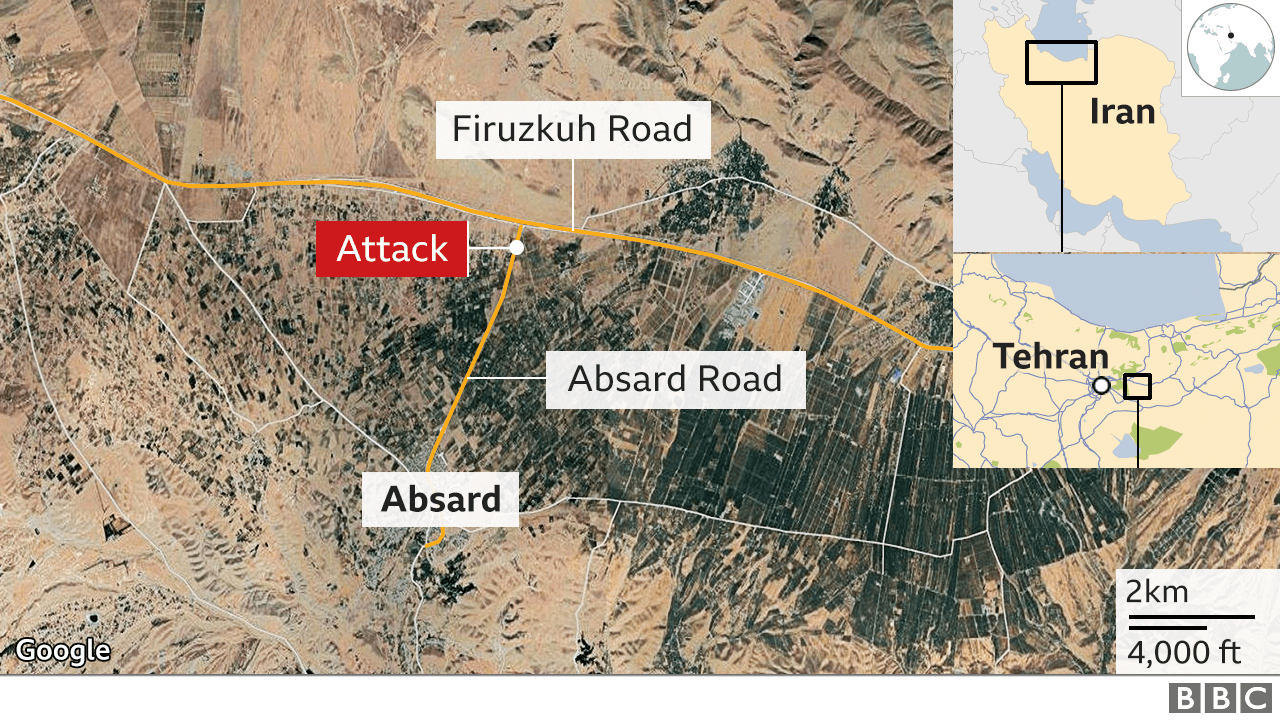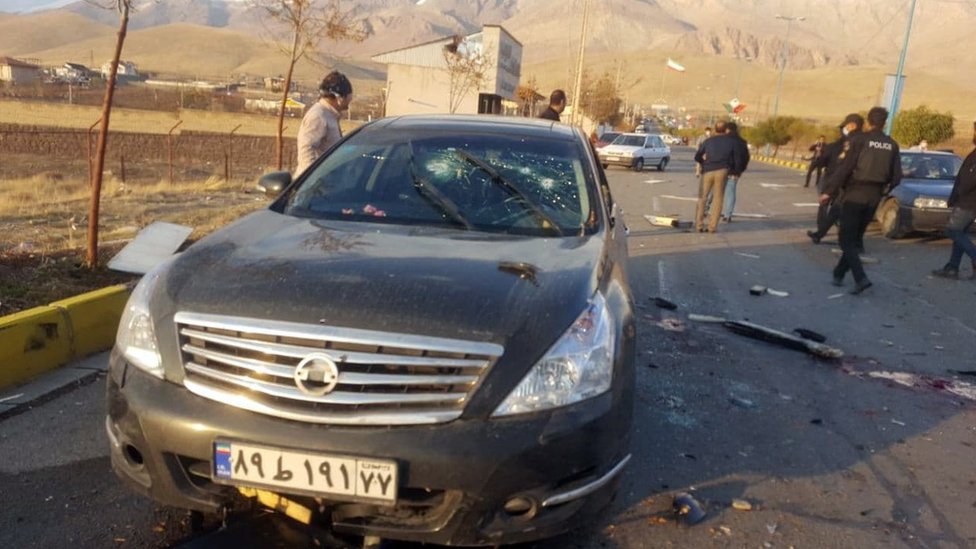
Mohsen Fakhrizadeh was shot dead in a convoy outside Tehran on 27 November.
Brig-Gen Ali Fadavi told local media that the weapon, mounted in a pick-up truck, was able to fire at Fakhrizadeh without hitting his wife beside him. The claim could not be verified.
Iran has blamed Israel and an exiled opposition group for the attack.
Israel has neither confirmed nor denied responsibility.
How was Fakhrizadeh killed?
The Iranian authorities have put out conflicting accounts of how the scientist was gunned down as he travelled in a car through the town of Absard.
On the day of the attack, the defence ministry said there was a gunfight between Fakhrizadeh's bodyguards and several gunmen.

One Iranian report quoted witnesses as saying that "three to four individuals, who are said to have been terrorists, were killed". A Nissan pick-up was also said to have exploded at the scene.
In a speech at Fakhrizadeh's funeral, the head of Iran's Supreme National Security Council said it was actually a remote attack, using "special methods" and "electronic equipment". But he provided no further details.
Gen Fadavi, the deputy commander of the Revolutionary Guards, told a ceremony in Tehran on Sunday that a machine-gun mounted on the Nissan pick-up was "equipped with an intelligent satellite system which zoomed in on martyr Fakhrizadeh" and "was using artificial intelligence".

The machine-gun "focused only on martyr Fakhrizadeh's face in a way that his wife, despite being only 25cm [10 inches] away, was not shot", he said.
The general reiterated that no human assailants had been present at the scene, saying that "in total 13 bullets were fired and all of them were shot from the [weapon] in the Nissan". Four bullets struck Fakhrizadeh's head of security "as he threw himself" on the scientist, he added.
Iran's Supreme Leader, Ayatollah Ali Khamenei, has vowed to avenge the assassination, demanding the "definitive punishment" of those behind it.
On Friday, Israeli public radio reported that Israeli security officials had warned some former nuclear scientists to be cautious. The experts used to work at the reactor in Dimona, a top secret nuclear site deep in the Negev desert.
The Israeli government did not comment on the report, which came a day after the Israeli foreign ministry told Israeli citizens travelling in the Middle East and Africa to be vigilant in light of what it called threats from "Iranian elements".


The claims made about the attack being carried out using such a sophisticated high-tech weapon are as alarming as they are dystopian.
It's worth stressing that they have not been verified by anybody.
The use of AI in conflict is a concept that has worried many scientists for some time. In 2015, the late Professor Stephen Hawking was one of 1,000 scientists who signed an open letter calling for a ban on the development of artificial intelligence for military use.
However, on this occasion, Iran's claims have been greeted with scepticism.
Analyst Tom Withington, who specialises in electronic warfare, said the reports should be treated with "a healthy pinch of salt", and added that Iran's description appeared to be little more than a collection of "cool buzzwords" designed to suggest that only a supremely mighty force could possibly have succeeded in this mission.
Professor Noel Sharkey, a member of the Campaign Against Killer Robots, said the consequences of military forces having access to such weapons would have "unimaginable consequences".
"If such devices were autonomous, using face-recognition to pinpoint and kill people, we would be on a downhill roll that would entirely disrupt global security," he said.

Why was the scientist a target?
Mohsen Fakhrizadeh was head of Iran's Organisation of Defensive Innovation and Research, known by its Persian acronym SPND.
Israeli and Western security sources say he was instrumental in Iran's nuclear programme.
They believe the physics professor led "Project Amad", a covert programme that Iran allegedly established in 1989 to carry out research on a potential nuclear bomb.
The project was shut down in 2003, according to the International Atomic Energy Agency.
However, Israeli Prime Minister Netanyahu said in 2018 that documents obtained by his country showed Fakhrizadeh led a programme that was secretly continuing Project Amad's work.
Iran insists its nuclear programme is entirely peaceful and that it has never sought a nuclear weapon.
Analysts have speculated that assassination of Fakhrizadeh was not meant to cripple the Iranian nuclear programme but rather to put an end to the prospect of the US rejoining the 2015 Iran nuclear deal when President-elect Joe Biden takes office next year.
"used" - Google News
December 07, 2020 at 08:02PM
https://ift.tt/33T0cc2
Mohsen Fakhrizadeh: 'Machine-gun with AI' used to kill Iran scientist - BBC News
"used" - Google News
https://ift.tt/2ypoNIZ
https://ift.tt/3aVpWFD
Bagikan Berita Ini














0 Response to "Mohsen Fakhrizadeh: 'Machine-gun with AI' used to kill Iran scientist - BBC News"
Post a Comment